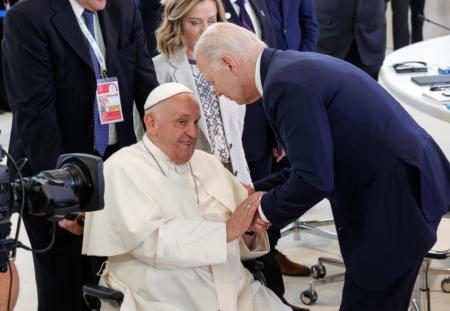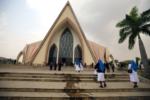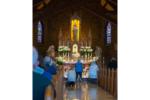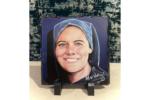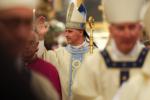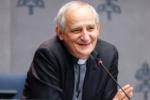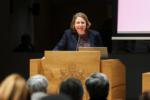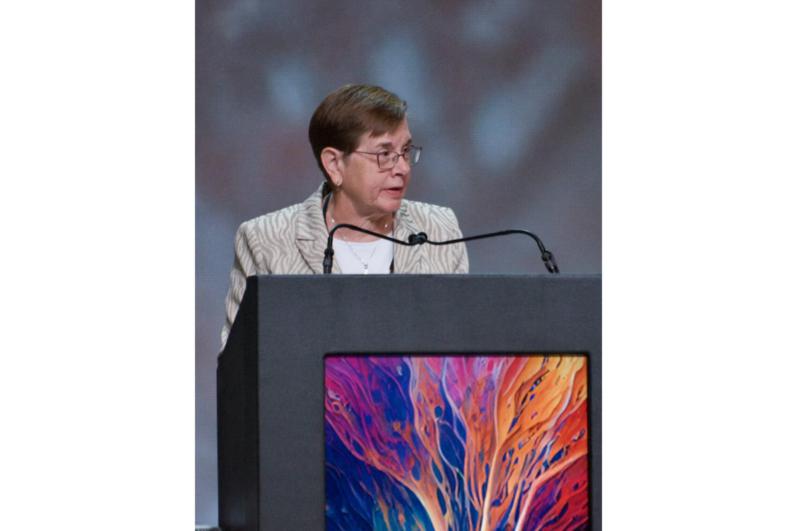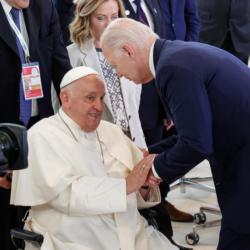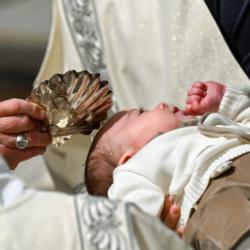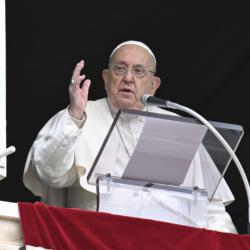LCWR assembly invites sisters to become 'catalyst for social transformation'
ORLANDO, Fla. (OSV News) -- However religious life evolves, whatever new religious life emerges, consecrated women will continue to answer God's call with a courageous "YES," sisters heard during the annual assembly of the Leadership Conference of Women Religious.
Dominican Sister Maureen Geary, outgoing LCWR president, told the more than 800 people gathered in Orlando for the assembly that what matters is the mission, whatever that mission may be. LCWR represents about two-thirds of the nearly 36,000 sisters in the United States.
Answering the question in the assembly's theme, "Who then shall we be?" Sister Maureen cited the First Book of John: That while we are now children of God, what we will be is not known. But there are some things that will not change.
"We shall be women who answer the call to serve in this world in which we live -- this world that has so much pain and so many needs," she said Aug. 14. "We shall be nourishment for the life of the world."
In her address, Global Sisters Report noted, Sister Maureen drew from the wisdom of poets Rainer Maria Rilke and Rumi, theologians St. Joseph Sister Elizabeth Johnson and Frederick Buechner, Sister Thea Bowman, a candidate for sainthood, and Dr. Seuss, often paraphrasing Seuss' book, "Oh, the Places You'll Go!" about being on the brink of something profoundly new.
While we don't yet know where we're going, she said, that doesn't matter, because it is the journey that shapes us into who we will become, not the destination.
"It is the process that makes the Synod for Synodality a force for shaping who we shall be, as a church committed to mission, communion and participation," said Sister Maureen, whose presidential term ended with the Aug. 16 close of the assembly. "By extension of our mission, we also shape society -- thus, where we go shapes us into who we shall be."
Living the religious life also means living the mission.
"What we shall do now is mission, what we shall later do is mission, as the road before us is revealed," she said. "The mission of Jesus Christ, whoever we shall be."
The assembly opened Aug. 13 with various welcome messages, including one sent by Sister Simona Brambilla, secretary of the Vatican's Dicastery for Consecrated Life and Societies of Apostolic Life. In her letter, Sister Simona wrote that "if we allow it, consecrated life can truly be a catalyst for social transformation," and wished attendees "a time of great peace and wisdom."
LCWR leaders also acknowledged that Florida is where the Trail of Tears began, the forced migration of Native Americans who were driven from their ancestral lands to Oklahoma, and that it was once a bastion of slavery and the site of the Pulse Nightclub massacre, a 2016 hate crime targeting LGBTQ persons that killed 49 and wounded 53 others.
Orlando Bishop John G. Noonan noted that Florida was also the site of lesser-known atrocities and sacrifice, such as the Florida Martyrs, and where the Sisters of St. Joseph were arrested and imprisoned in 1913 for teaching Black children in St. Augustine.
Keynote speaker Father Bryan Massingale added to the list, noting Florida has made it illegal to teach students "lessons that would make a student uncomfortable about their race," forcibly bused people seeking asylum to other states, has been at the forefront of efforts to dismantle efforts for diversity, equity and inclusion, and reversed policies promoting green energy, despite experts warning that climate-related sea level rise may have the lower third of the state underwater by the year 2100.
He said the point is not to dump on Florida, but that "the events, trends and tensions we see here are a mirror or microcosm of trends we see in the nation and our world."
Father Massingale is a priest and professor specializing in social ethics, and has a passion for advancing a Black approach to Catholic theological ethics, focusing on the impact of religious faith as an instrument of social injustice and a catalyst for social transformation.
He cited Pope Francis saying we are not in an era of change, but in a change of eras, and that the rise of hatred and division stems from fear of that change.
"We are no longer a white, Christian nation, and many white Christians are fearful and angry," Father Massingale said. The changes are "experienced as an existential threat that undermines one's self-identity and the foundations upon which some believe the country was built."
He cited scholar Walter Brueggemann, saying that when those losses are unacknowledged, unprocessed and "unmourned," it turns to violence and prevents any kind of progress.
"We live in a time of unvoiced and ungrieved loss," Father Massingale said, pointing out that religious life is also in a change of eras and that the losses the changes are creating must be named and lamented for new life to emerge. "Unvoiced loss becomes a source of anger, depression, lack of hospitality, and a perception of the new as threat, not gift."
The key, he said, is that lament must become the prelude to action and change.
"Grieving and lamenting the loss of the present prepares us for the arrival of the new. Lamenting allows us to greet the arrival of the new as a gift, not a threat," Father Massingale said. "Paradoxically, lament prepares the way for new beginnings."
He said this requires women religious to let their grief of the world's brokenness inspire action for a more just country: "to teach us, the church, and especially white North Americans, how to grieve the passing of a world that must end," and to teach us to move gracefully into the new world; and to dream of the future to come and the legacy sisters will leave as their gift.
"Dare to dream. To dream boldly. To dream audaciously. To dream subversively," Father Massingale said. "We don't need less imaginative hope. We need more."
- - - Dan Stockman is national correspondent for Global Sisters Report.- - -SIDEBAR: New LCWR president will help navigate journey ahead for women religious
Dan Stockman
KALAMAZOO, Mich. (OSV News) -- Sister Kathy Brazda was several days into walking the Camino de Santiago, the 500-mile pilgrimage across Spain known in English as the Way of St. James, and her hand hurt.Her feet hurt, too, of course, but her hand ached because she had been clutching her map so tightly, for fear of getting lost, that her muscles began to rebel.
Then a wind gust came and blew the paper out of her hand. All she could do was watch it fly away."I'm not good with directions," Sister Kathy laughed, now nearly a decade after the incident. "But the route is well marked, so it's hard to get lost."As her map floated off over the Spanish countryside, Sister Kathy realized God gives us what we need for the journey. And carrying things we don't need -- even if it seems vital, like a map -- only slows us down or holds us back. She also realized that when she wasn't clutching her map, worrying about the route, she could better take in and experience her surroundings."It's a metaphor for life," she told Global Sisters Report in an interview ahead of the annual assembly of the Leadership Conference of Women Religious Aug. 13-16 in Orlando Florida.It may also be a metaphor for religious life in the United States: The world of Catholic sisters is changing dramatically, and there is no map for the journey they are on.But Sister Kathy, president of the Congregation of St. Joseph, will have to help guide that journey regardless, as LCWR's next president. She took office at the end of the assembly. Dominican Sister Maureen Geary moved from her year as president to the role of past-president, and Sister Vicky Larson, a member of the Sisters of the Presentation of the Blessed Virgin Mary, became president-elect.LCWR, which represents about two-thirds of the nearly 36,000 sisters in the United States, drew about 800 sisters to the assembly to "name and look critically at what is happening in the world today and in religious life in order to see the compelling call to religious life at this time."Sister Kathy, 64, grew up in a tight-knit family in the Chicago suburb of Cicero, where "everyone in our neighborhood was Polish and Catholic." She studied English education at the University of Illinois' Chicago campus, then taught in inner-city schools around the Windy City, including Maria High School, run by the Sisters of St. Casimir.In 1983 she joined the Sisters of St. Joseph," congregation, and after formation returned to teaching. But before she took her final vows, she decided she wasn't ready. She returned seven years later.
She made her vows and became a pastoral associate in a parish for 10 years before leaving in 2007 to co-found and direct Taller de José, a sponsored ministry of the congregation that accompanies people in need, connecting them to services available to help them. After a decade there, she joined the team of the Chicago Archdiocese's revitalization effort, Renew My Church.
She was elected to her congregation's leadership team, and in 2018 elected to her first five-year term as president, then joined the national board of LCWR.
In May LCWR's national board appointed Sister Kathy to fill the rest of Sister Sue Ernster's term as president-elect. A Franciscan Sisters of Perpetual Adoration, Sister Sue was voted in last year to the post but resigned to dedicate more time to her own congregation's needs.
Sister Kathy wasn't sure whether to accept the board's appointment -- it meant her congregation would have her full attention after only two years instead of three, but it also meant the most intense year of the term would be a year earlier than expected.
"God had a different plan," Brazda said. "He says 'Hold your hands open,' even though you have the page with the map in your hand."
